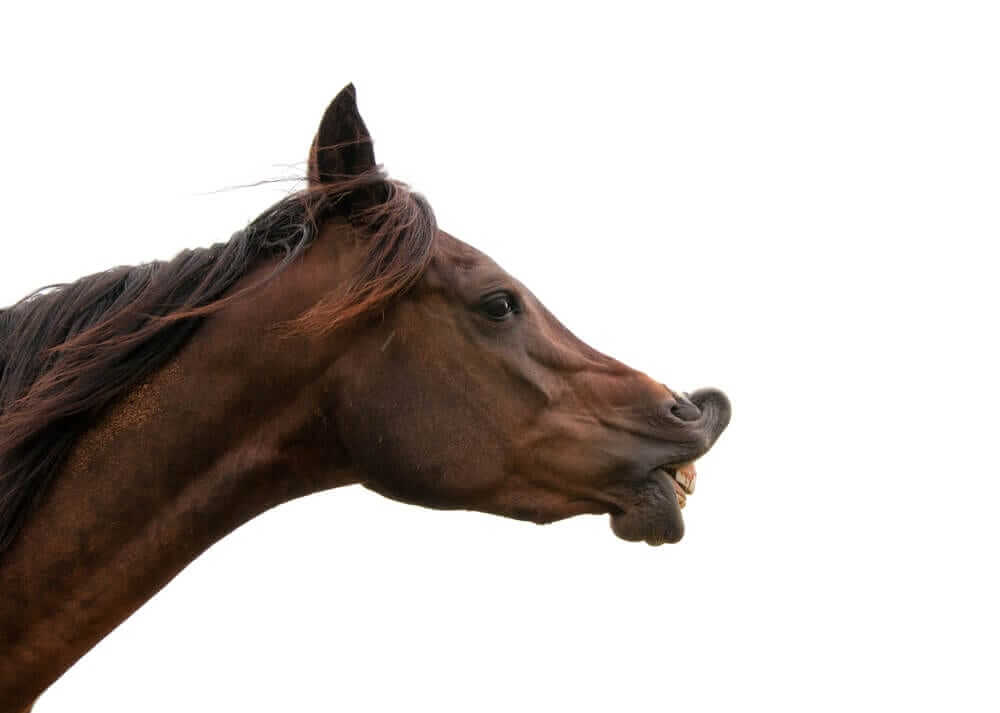Your horse refuses to eat a supplement or even a feed. You put in a lot of effort to help them with their health or a medical condition, and yet, they walk away from their dinner! Not an uncommon problem, but certainly a frustrating one for many owners. So, what do you do? Is it the supplement? Your feed? Or maybe your horse? It could be a combination of all three, but with some detective work, patience, and persistence, you can change the situation and maybe their health in the process! The picky eater horse can be helped!
Here you are with a horse that has a medical issue, maybe an allergy or lameness, and you are putting the effort into proper supplementation to aid their recovery, but they refuse to eat it! How dare they, right? You put that dose of supplement into their normal grain, potentially wasting a dose, and now they walk away from their evening meal.
What’s the deal? Is it your feed? Is something wrong with the supplement? Are they just not feeling good today?
Picky Eaters and the Horse
Likely there is nothing wrong with your feed, the supplement, or your horse. In reality, it is something going on inside of your horse that is creating the problem. It’s their taste buds, but the problem goes much deeper than just the fact that you think your horse doesn’t like the supplement.
These types of horses to me are picky eaters and almost every horse owner has experience in this area. It is also something that I encounter in our rehab patients, creating difficulty in providing a prescribed supplement regimen. I can prescribe a formula to aid in their recovery, but it does very little if they won’t eat it!
If we step back and look at the situation, many of these ‘picky’ horses will actually refuse a carrot, a slice of apple, or even a handful of whole oats. Pretty odd. Certainly not all of them fall into this group, but a high percentage do. So, how can they turn their nose away from a carrot or even whole oats? The reasoning lies in the tastes that they have developed, become accustomed to over time, and also the influence of the gastrointestinal microbiome.
Digging Deeper into the Problem
Looking at this group of horse, most of them are on processed, commercial feeds, often having the feed changed periodically as their taste wanes from one and desires another. Processed foods have a different taste than real foods, often higher in additives, added sugars, colors, preservatives and even food sources. Many of these grains are not even using ‘real’ foods, but modified versions of them or even synthetically created sources of nutrients. The fact is that they are not food, at least in the traditional sense. Feed them enough of these types of foods and they become accustomed to them, their palate changes, and so does the bacteria in their digestive tract.
When it comes to the microbiome, a horse that eats whole foods, minimal grains and has access to plenty of pasture has a slightly different bacterial population from a horse that eats commercial grains, stalled, and kept on a dry lot. This population of bacteria then can influence the tastes that the horse craves, often with the craving for sugar or sweets being prominent, as these carbohydrate sources feed the bacteria that have overgrown. Even whole grains, vegetables, and some fruits are lower in carbohydrates than some foods on the market. Despite their natural state, they are not as sweet or tasty, as some commercial feeds.
In reality, this situation is no different from a child that was raised on high sugar cereals, processed foods, sugars, and candy. Then you attempt to change that child’s eating habits, encouraging more fruit and vegetables. What is the result? They cry, whine, and walk away from their dinner. If you succeed on getting them to eat the vegetables and fruits, and truly eliminate the other negative foods, their tastes will change, their gut microbiome will change, and their health will change.
It’s not a coincidence that most picky eater horses also have ongoing health problems! There is a reason, and their diet, established microbiome, and eating habits all play a role. Test your horse’s microbiome through a fecal culture.
Resolving the Dilemma with the Picky Eater Horse
If you want to truly help your horse, you will realize that the efforts you are making with the supplements you have chosen are likely not the problem. Or it could be, dependent on the supplement. There are a few things to keep in mind.
When it comes to many supplements on the market, in order for the manufacturer to help you they must make their product palatable to your horse. This means that many companies add a lot of sugars, sweet flavors, or artificial sweeteners to their products. More sugar usually means more likable by your horse! However, this is not a good thing, as outlined above.
When it comes to our Cur-OST Equine Supplements, we have no added artificial flavors, sugars, preservatives or other chemicals. In most we have added a whole, organic banana fruit as a component of the blend. This is the real fruit, not a flavor. Given this, no addition of sugars or otherwise, some horses may turn their noses away from their first few meals. Reason being…they are craving sugars and their are no added sugars to those supplements. This isn’t a huge issue in using our products, but it does happen, however, there are ways to resolve the problem.
In order to resolve this, most of the time we need to evaluate and modify their main diet, remove contributors to the problem. Just like with the child above, we can’t keep giving him cake if we want him to eat his spinach.
The first step for me is to get the horse eating real foods. So, we use whole oats, some alfalfa pellets, maybe flaxseed, carrots, peas, or even chia seeds as a food source. Even with these natural foods, they are not a meal. Forage is the meal for a horse. These are just a snack, a medium for supplementation to improve their health. In many cases, some picky eaters will walk away from that meal. That’s okay. Don’t give into them, but let it sit, and see what they do overnight. Over time, most will start to pick, and finally eat the meal. If they don’t, here are some suggestions:
- Natural Fruit Powders (blueberry, strawberry, raspberry)- natural sources of sweetness
- Honey (1 tsp mixed with feed)
- Monk fruit powder (1/4 tsp)
- Olive Oil (1/4-1/2 cup) but be careful with an overweight horse
I usually give them a week to get adjusted to the new food regimen. After that time, they are usually eating it and doing well. In fact, some of their health conditions may actually improve just with this simple diet maneuver!
After that week, I will start to add supplements in, usually starting at 1/4-1/2 dose, especially if using more than one supplement. This lower dose prevents an overload of nasal and taste bud overload, allows them to get used to it slowly. If they are finicky still, not sure about the supplement, I will add more fruit juice or other medium mentioned above.
Usually within 10 days, the issue of being a picky eater is no longer a problem. The horses have a new diet, a new supplement regimen, and are on their way to health!
Another great option for those picky eaters is to feed a whole food diet or supplement, which will fortify the gut with proper fiber to balance the microbiome, but also provide essential macro and micronutrients to aid in overall health and inflammation. There are two that we use in our patients, both of which have a great flavor and are readily accepted by most horses due to containing Monk Fruit. These can be used as the ‘base’ formula in which other supplements can be added.
Progress can be made, day by day, regarding the diet, supplements, and the health of your horse. If you need additional information, please call reach out to us, or for more detailed advice on your particular horse, set up a consultation with Dr. Schell.
Recommended Reading: The Equine Diet and the Picky Eater Horse
Author: Tom Schell, D.V.M., CVCH, CHN



I had read this some time ago and thought it interesting. I am especially intrigued by the possibility that the microbiome influences what we want to eat. Knowing that the microbiome has a direct link to the brain via the vegas nerve and that different microbes live on different nutrients, it seems plausible a larger population of those needing sugar would have influence.
It would then make since to me that when sugar is removed the microbiome shifts rather quickly and different sets of bacteria are nurtured and grow. The life cycle of these bacteria is short, a couple of days, so it does seem likely a diet can be changed relatively quickly. I think of my own sugar cravings and how they subside once I eliminate sugar from my diet.